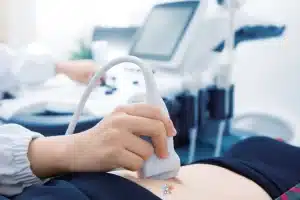Most first time mothers are surprised at the recovery process after the birth of a baby. Your body needs to heal physically after the baby is born. Gradually, you will feel better. Overtime, your body will return to its original shape. This won't happen over night. You will need to give your body time to heal, eat well and exercise.
by Patricia Hughes
Most first time mothers are surprised at the recovery process after the birth of a baby. Your body needs to heal physically after the baby is born. Gradually, you will feel better. Overtime, your body will return to its original shape. This won’t happen over night. You will need to give your body time to heal, eat well and exercise.
Physical Aspects of Recovery
After the birth of your child, your uterus has to return to its original size. This process is called involution and begins with the delivery of the [tag-tec]placenta[/tag-tec]. It takes about two months after the birth for the uterus to completely return to its original size. You may be surprised to find that you still look pregnant after the baby is born. Keep in mind that it took nine months for your uterus to fully expand. It will take time to shrink too.
You will experience contractions caused by the shrinking of the uterus. These are not as painful with the first pregnancy as they are with the second and subsequent pregnancies. You will feel these after pains most in the first three days after the [tag-ice]baby[/tag-ice] is born. After the third day, they will gradually get better. Don’t be afraid to ask for pain relief medications if the pains are bad.
You will experience some pain in the perineum. This pain will be worse if you had an episiotomy during the birth. An episiotomy is a cut made in the perineum during delivery. You will have stitches in this area. To help soothe the soreness, you can take medications, use a sitz bath, put an ice pack on the area or try Dermoplast spray.
You will experience some bleeding after the birth of your baby. This bleeding is called lochia and will last between two and four weeks. It will start off bright red and somewhat heavy in the early days. The bleeding will get lighter and turn pinkish until it gradually disappears. Your doctor will probably tell you not to use tampons during the six week recovery period.
When your milk comes in, you may experience engorged breasts. This will happen whether you plan to breastfeed or not. The milk usually comes in on the third day after the baby is born. Breastfeeding frequently can help relieve engorgement. If the baby is sleeping, you can pump some milk to save for later. Store the milk in breast milk bags in the freezer. Ice packs or a hot shower may help relieve the engorged feeling.
Nearly all new mothers suffer from a lack of sleep. New babies wake frequently to feed during the night. Between your physical symptoms and not sleeping through the night, you may not feel well. Getting rest is important for healing, both physically and emotionally. Make up for lost sleep at night by napping during the day. Sleep when the baby sleeps.
Emotional Aspects of Recovery
You may find that you are very emotional after the birth of your baby. This is very normal and is caused by a drop in estrogen and progesterone after the birth. Occasional sadness or crying is called “baby blues” and is very typical. Be careful to watch for warning signs of post partum depression. If you have any signs of depression, or feel bad most of the time, talk to your doctor. There are treatments that can help you.
There are other reasons new moms get emotional after the baby is born. For some women, lack of sleep can cause emotions to flare. The best remedy for this is getting more rest. For other women, body image is the problem. First time mothers are often surprised at how long it takes to get your body back. You won’t be as thin as you were prior to pregnancy for a while. Give yourself time to get back in shape. Buy some clothes in a larger size. This will help you look good and feel better.
Many new mothers try to do too much too fast after the baby is born. Cooking, cleaning and entertaining guests can be exhausting. Don’t be afraid to ask for help. Family and friends are often more than willing to pitch in, if you ask. Limit visitors in the early days home from the hospital. You need this time to rest and bond with your baby. Later, limit the length of time people stay when visiting. If they want to hang out longer, they need to help with cleaning or cook a meal.
Biography
Patricia Hughes is a freelance writer and mother of four. Patricia has a Bachelor’s Degree in Elementary Education from Florida Atlantic University. She has written extensively on pregnancy, childbirth, parenting and breastfeeding. In addition, she has written about home décor and travel.
New at More4kids – learn how to deal with Stretch Marks
No part of this article may be copied or reproduced in any form without the express permission of More4Kids Inc © 2006 All Rights Reserved













Add Comment